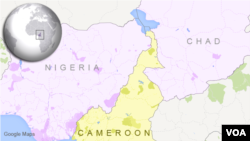Aid groups and the government of Cameroon say they distributed rice, millet and beans to at least 30,000 people this week along the central African state’s northern border with Chad and Nigeria.
Refugee populations and host communities are among the recipients.
The government and relief agencies now aim to reach a total of 4 million people over the next six weeks.
Distribution is complicated by torn-up roads and ongoing clashes between government troops and separatist groups in Cameroon’s Northwest and Southwest regions.
Aid agencies have also reported sporadic Boko Haram attacks but the government has said it will protect all aid workers.
Ayissi Nouma is coordinator of the Emergency Food Project at the Cameroon Red Cross, one of the agencies distributing food aid.
Nouma said undernourishment, famine and movement of people out of their communities in search of food in Cameroon's northern border with Chad and Nigeria are the direct consequences of severe floods and attacks by elephants and migratory birds on plantations. Nouma said Boko Haram terrorism and clashes between herders and fishers that displaced more than a 100,000 people, including farmers to Chad, are among the causes of current food shortages.
Nouma spoke on Cameroon state broadcaster CRTV on Friday.
The separatist crisis in the west and Boko Haram attacks in the north have disrupted food production and left millions of Cameroonians facing hunger in recent years.
Russia’s invasion of Ukraine made the situation worse. Before Russia’s Black Sea blockade, Cameroon imported 60% of its wheat from Ukraine. The cutoff led to a nearly 50% increase in the price of bread.
More recently, floods that swept through towns also rendered several hundred homeless and hungry, the government said. Those affected include the economic hub, Douala, and Buea and Limbe, both English-speaking western towns.
Gabriel Mbairobe, Cameroon’s agriculture minister, said climate shocks added to the present food shortage Cameroon is witnessing.
"Agropastoral production has been disrupted due to climate hazards, high rainfall in the northern part of the country, sudden cessation of rains in the southern part which did not allow crops to complete their cycle,” Mbairobe said.
Crop pests as well as the destruction of fields by elephants and sociopolitical and intercommunity conflicts are affecting 27,000 producers, he added.
Mbairobe said Cameroon’s government and its partners are ready to provide emergency food and nutritional supplies to people threatened by hunger and disease.
He said besides distributing food aid, Cameroon is providing hybrid seeds and fertilizers to farmers who agree to return to their farms.
The government said it has also distributed drought-tolerant crops to several thousand farmers on Cameroon's northern border with Chad and Nigeria.
Meanwhile Cameroon's livestock ministry reports that several hundred heifers, which quickly adapt to harsh climatic conditions and produce more milk than the local breed of cattle, have been distributed to herders in the area.




